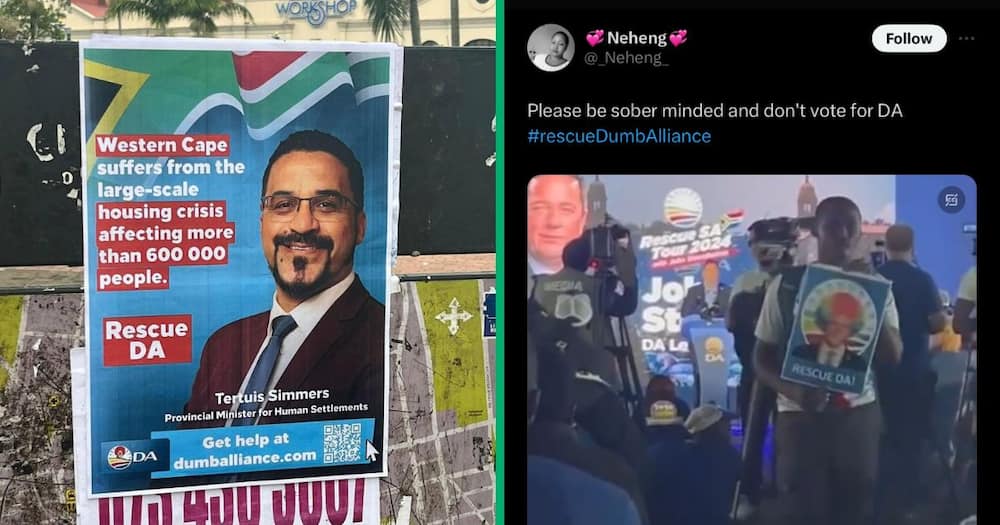Democratic Alliance in Kwazulu-Natal: A Promise Too Far?
In the streets of KwaZulu-Natal, the political tension was as palpable as the humidity in the coastal air. The Democratic Alliance (DA), South Africa's official opposition party, had been working fervently to widen its influence beyond its traditional strongholds, but in this region, their ambitions seemed to clash with the complex reality of local sentiments. The history of KwaZulu-Natal, deeply rooted in supporting the African National Congress (ANC), presented a difficult challenge to the DA's aspirations.

Source: UGC
As John Steenhuisen, the DA's leader, addressed the audience, his mission was clear: to rally the crowd behind a vision of change and progress under the DA's guidance. But not all were swayed. A tangible air of defiance pulsed through the crowd as signs of dissent were raised high. Hashtags like #rescueDumbAlliance flitted through social media, echoing the sentiments of the posters waved by individuals in the crowd. "DumbAlliance" and "Clown Steenhuisen" the posters declared boldly, creating a stark contrast to the optimism of Steenhuisen's speech. These symbols of protest quickly ceased and their bearers removed from sight, hinted at deep-seated friction, leaving a trail of questions as potent as the political rhetoric in the air.
The opposition narrative continued beyond the immediacy of the rally. It spread across the cityscape, emblazoned on flyers and posters that cast the DA in a dubious light. Stories of alleged corruption and incompetence in DA-run regions, like the mishandling of the Kentron substation and the persisting housing crisis in the Western Cape, were recounted with fervour. The visual and verbal language was harsh, direct, and unyielding, suggesting that the problems associated with DA governance were not isolated incidents but indicative of broader systemic issues. This expansive campaign of dissent, now underscored by the viral hashtag #rescueDumbAlliance, signalled a deep-rooted doubt toward the DA's ability to deliver on its promises, framing their campaign promises as nothing more than well-packaged air.
This was the backdrop against which the DA was trying to construct its narrative of change and governance. However, the local population's mistrust and the evidence of discontent presented a hurdle that seemed insurmountable. The DA’s promises, when set against the lived experiences of those in Cape Town, rang hollow. High crime rates and persistent poverty in the regions under their governance were not just statistics; they were the lived realities of people who the DA now sought to persuade. The juxtaposition of the DA's visions for the future against the backdrop of current challenges under their administration painted a picture of promised progress that many believed was nothing more than an illusion.
As the DA tried to win over people in Kwazulu-Natal, the day showed us how big the gap is between what politicians promise and what people think of them. The folks here remember the promises that were not kept in Cape Town too, so they're not quick to believe what the DA says now. All the let-downs from before are making it hard for people to trust the DA’s new plans. In South Africa, where people have long-standing loyalties, the DA's efforts in Kwazulu-Natal don't look like they're about to succeed. Instead, it feels like they're fighting a losing battle, with doubt and disappointment from the past weighing them down.
Written by Patrick Thurston, an independent journalist.
Source: Briefly News
